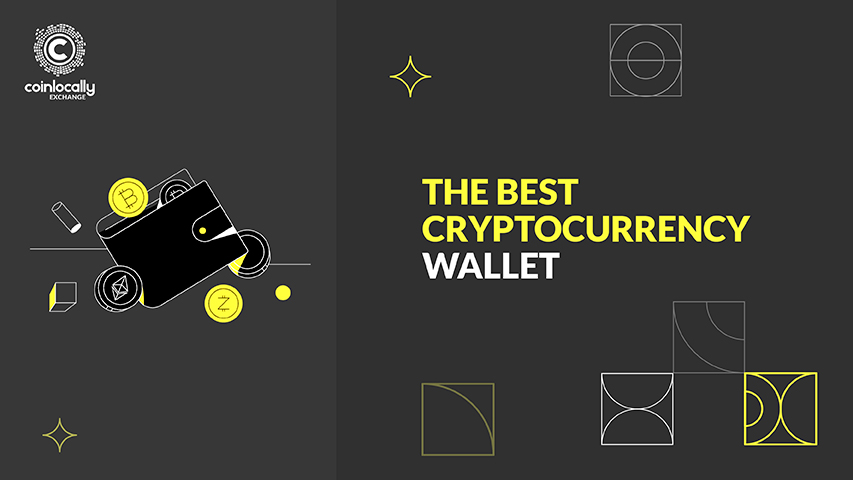The best cryptocurrency wallet is essential for purchasing, exchanging, and selling cryptocurrencies. They are required for you to know How To Become A Successful Crypto Trader, to safeguard and validate your transaction information and keep your cryptocurrency secure. Unlike crypto exchange wallets, custom crypto wallets provide traders with specialized software or hardware solutions, also known as hot and cold crypto storage. Read the following article regarding Cryptocurrency wallet reviews and recommendations.
Some people searching for the best cryptocurrency wallet look for the best cryptocurrency exchanges, so we have included Coinlocally Exchange in this article. Suppose you are more interested in learning where to buy and sell cryptocurrency and the pros and cons of centralized vs. decentralized exchanges. In that case, you may consider reading our piece on the Best Crypto Trading Platforms and Exchanges.
Table of Contents
• The Best Cryptocurrency Wallet
• How to Set Up a Crypto Wallet
• What to Look for in the Best Cryptocurrency Wallet
• How To Choose the Best Cryptocurrency Wallet
What is the Best Cryptocurrency Wallet?
The best cryptocurrency wallet could be a software or hardware device that stores cryptocurrency, such as Bitcoin. You can consider hardware wallets for maximum security, which enable consumers to buy, sell, and store digital currency.
The best Cryptocurrency wallet can be physical hardware, software installed on your computer, an app on your phone, or even cloud technology. There are also multi-currency wallets for diversified holdings.
While crypto wallets store your cryptocurrency, crypto exchanges are businesses that facilitate cryptocurrency trades. Use an exchange that combines cryptocurrency purchasing and storage with a wallet if you want to make short-term investments or are new to crypto.
This article will teach you everything you need to know about the best cryptocurrency wallet and what to expect as you gain more expertise trading with your cryptocurrency account.
The Best Cryptocurrency Wallet
The following cryptocurrency wallets are the top-rated digital wallets for cryptocurrencies connected with cryptocurrency exchanges, allowing you to trade and store your cryptocurrency in one location. As a result, these wallets are ideal for crypto newcomers or those that trade frequently.
• Coinbase
Coinbase, widely regarded as the finest option for newbies, has an easy-to-use interface to assist you in getting started. Coinbase stores 98% of its money offline (“cold”), a secure way to store cryptocurrency because the coin cannot be accessed online.
• Gemini
Gemini, another excellent option for crypto newbies, provides many tools for newcomers and inexpensive trading fees. There are other insurance alternatives to keep your cryptocurrency safe.
• Kraken
Kraken boasts inexpensive trading fees and powerful trading capabilities. Kraken, like Coinbase, keeps the vast bulk of its cryptocurrency offline.
Exchanges may only sometimes provide built-in wallets. Hybrid exchanges employ blockchain wallets; you can access a set quantity of coins with credit rather than cryptocurrency. If you want to keep your crypto long, use these hybrid services sparingly. Use a dedicated crypto wallet for easier access.
How do Crypto Wallets Work?
The best cryptocurrency wallet protects your cryptocurrencies by storing your crypto keys and making your coins available when needed. Best crypto wallets for asset protection consists of a pair of keys. The public key and the amount obtained or lost in a given transaction are recorded on the blockchain. The wallet’s owner can use the private key to claim the money associated with the public key.
- A public key is an automatic string of letters and numbers from the best cryptocurrency wallet provider. A public key could have the following format: B1fpARq39i7L822ywJ55xgV614.
- A private key is a string of numbers and letters that only the wallet’s owner should know.
Think of the best cryptocurrency wallet or a blockchain wallet for secure storage of digital assets similar to an email account. You must provide your email address to receive emails.
This is your public key for the best cryptocurrency wallet, which you must share with others to participate in any blockchain transaction. You would never, however, give someone your email account password. In crypto wallets, that password is equivalent to your private key and should never be shared with anyone.
Users of crypto wallets can use these two keys to participate in transactions without jeopardizing the integrity of the currency being traded or the transaction itself.
To authenticate any payments transmitted or received, the public key linked with your digital wallet must match your private key. When both keys are validated, your cryptocurrency wallet’s balance will change or remain unchanged.
Types of Crypto Wallets
There are numerous types of cryptocurrency wallets, and Choosing the right cryptocurrency wallet is important. Hot wallets provide instant, round-the-clock access to your cryptocurrency, whereas cold wallets are better for long-term storage. Non-custodial wallets give you complete control over your funds, whereas custodial wallets provide specific benefits and safeguards.
Let’s look at the various cryptocurrency wallets:
Hot Wallets
“Hot wallets” are always-on internet-connected digital devices. The greatest benefit of hot wallets is their portability. Your public and private keys are saved and encrypted on the app or website associated with your wallet to access them from any internet connection device. Because of their ease of use, they are great for those who trade frequently and are considering spending bitcoins.
Hot wallets are more vulnerable to cyberattacks, such as malware attacks or exploits, because they are online wallets with enhanced privacy features. They are, however, easier to regain access to if the private key is lost. Only a seed phrase (a long password) can unlock a hot wallet because the key is encrypted.
Hot wallets are classified into three types:
- Desktop wallets are compatible with browsers and desktop computers.
- Mobile wallets are apps that run on mobile operating systems, and these mobile wallets, for convenient cryptocurrency access, are available for smartphones and tablets.
- Hybrid wallets work on both desktop and mobile platforms.
Hot wallets have some pros and cons, as follows:
PROS
- Extremely convenient; they can be accessed from any location with an internet connection.
- Access is easier to regain if the private key is lost than with cold wallets.
CONS
- Less secure than cold wallets and susceptible to a broader range of attacks
- In the case of custodial wallets, your keys are stored on the exchange’s servers.
Cold Wallets
They keep your digital keys offline on hardware or a sheet of paper. While connected to a computer, hardware wallets, which look like USB drives, allow you to buy, sell, and trade cryptocurrency.
Cold storage wallets are intentionally designed to be difficult to hack. These wallets are purpose-built to be difficult to hack. Unless the wallet owner falls victim to a phishing attack, hackers cannot remotely obtain the wallet owner’s keys. To access your crypto, a thief must first obtain the USB drive, then crack its password.
Because of the high level of security, wallet owners may make mistakes. If you lose your USB drive or a piece of paper and don’t have a backup of your private key, you’ve effectively lost access to your cryptocurrency. In most cases, recovering access to a cold wallet is nearly impossible due to the two-key security system, as opposed to hot wallets, which allow access via a seed phrase.
Pros
- Offline storage makes it more secure than hot storage wallets.
- Hot storage wallets support a wide range of hardware wallets.
CONS
- On average, transactions take longer.
- Recovery of currencies is nearly impossible without a backup of your digital keys.
How to set up a crypto wallet
Setting up a cryptocurrency wallet is generally a simple process that takes only a few minutes. The first step is to decide the type of best cryptocurrency wallet you want to use, as hot and cold wallets have different setup procedures. Then you must do the following:
For hot wallets…
- Download and Install the wallet. Before downloading any software, ensure that the wallet is legitimate. Crypto scams are becoming more common, and it’s critical to determine whether the company behind a wallet actually exists. Verify that you are on the correct website and not a fake version designed to steal your information when using web wallets.
- Set up your account and security features. If you use a non-custodial wallet, your private key will be a random 12 to 24-word string of words. You will only access your cryptocurrency if you remember these. You can enable additional security tools, such as two-factor authentication and biometrics, during or after the setup. The process for custodial wallets is a little more involved, and you’ll need to go through a Know-Your-Customer (KYC) verification process to validate your identity.
- Fund your cryptocurrency wallet. Non-custodial wallets may require you to transfer crypto from another wallet, as not all wallets allow you to buy crypto with fiat currency directly. In some cases, you’ll need to fund custodial wallets with a credit or debit card before you can buy cryptocurrency.
For cold wallets…
- Buy the wallet online. Avoid third-party resellers when purchasing a cold wallet. To avoid issues such as the device being tampered with beforehand, purchase the best cryptocurrency wallet directly from the developer.
- Download and install the device’s software. Each manufacturer’s software must be installed on the hardware device before use. Download the software only from the company’s official website. Then, to create your best cryptocurrency wallet, follow the on-screen instructions.
- Make a cryptocurrency deposit. You’ll need to transfer cryptocurrency into your hardware wallet from somewhere else, such as a cryptocurrency exchange. Some wallets may include an exchange that allows you to trade cryptocurrency while connected to your desktop computer or mobile device.
What to Look for in the Best Cryptocurrency Wallet
When looking for the best cryptocurrency wallet, it’s critical to ask yourself:
- How often do I trade? Will you be trading cryptocurrency on a regular basis or only on occasion? Because of their speed and convenience, hot wallets are preferable for active traders. Active traders, on the other hand, may benefit from a cold wallet by holding the majority of their currency there as a form of savings account.
- What do I want to exchange? Do you want to purchase and store Bitcoin, or do you prefer other types of cryptocurrency, such as altcoins and stablecoins? The crypto wallet you select should support the currencies you wish to trade as well as, ideally, other coins.
- What am I willing to spend? Do you intend to amass a large amount of cryptocurrency? Hardware wallets are ideal for this type of activity, but unlike hot wallets (typically free), they require an initial payment to own the wallet. Some hot wallets charge higher cryptocurrency trading fees but provide faster transactions or more functionality.
- What features do I require in a wallet? Do you intend to use cryptocurrency for anything other than trading? For example, traders who want to make money with their cryptocurrency passively should look for wallets that support crypto lending, staking, and deposits.
After investigating the aforementioned questions, we compiled a list of general recommendations for what to look for in the best cryptocurrency wallet:
- Supported currencies – When it comes to supported currencies and the best cryptocurrency wallet, the rule of thumb is “the more, the better.” Unless you’re only interested in trading Bitcoin — in which case, look for a Bitcoin wallet —We recommend using a wallet that supports at least a few popular altcoins like Ethereum, Cardano, and Solana.
- Accessible interface – Whether you’re a crypto veteran or a newcomer, an accessible, intuitive user interface is always appreciated. Look for wallets that do not require you to jump through hoops in order to begin basic trading.
- 3. 24/7 customer support – Although it is more beneficial for newer traders, having customer support available 24 hours a day is always a plus. This is especially true for wallets that are frequently updated and may contain bugs or visual flaws.
- Hardware wallet compatibility – Anyone serious about getting into cryptocurrency should consider purchasing a hardware wallet. Even those who do not trade frequently should consider using a hardware wallet to protect their most valuable assets. Hot wallets that are compatible with at least one hardware wallet manufacturer have an advantage because they can default to the model(s) supported by their wallet and move their cryptocurrency as needed.
How To Choose the Best Cryptocurrency Wallet
Examining over 25 crypto wallets to discover the best cryptocurrency wallet, we scored them on security, functionality, and cost. Because there are hot and cold crypto wallets, we considered different factors for each. Because of variable fees of exchange, network, and wallet feed, the cost of using a hot wallet is difficult to determine, whereas cold hardware wallets are physical products that must be purchased in a store.
The best cryptocurrency wallet is involved in the following categories:
- Safety – When it comes to the best cryptocurrency wallet, we prioritize safety. We preferred wallets with two-factor or multi-factor authentication, biometrics, multi-signature support, open-source code, and strong transaction security protocols. We generally avoid recommending hardware with additional points of failure, such as Bluetooth.
- Features – For features, we considered each wallet’s overall functionality. Wallets with more tradable assets, live charts, staking and lending capabilities, and hardware wallet compatibility received higher marks from us.
- Cost – The cost of the best cryptocurrency wallet varies depending on the type of wallet. We preferred low-cost cold wallets and hot wallets with exchanges that charge less for transaction processing. We also looked into wallets with adjustable transaction fees.
Risks of Using Cryptocurrency Wallets
One of the most severe risks of cryptocurrency is its volatility; consider Bitcoin’s wild price swings since 2020. Governments and institutions worldwide are still figuring out how to regulate cryptocurrency, which means consumers are still vulnerable to many crypto crimes and scams.
While companies that provide cryptocurrency wallets may offer customer and user guarantees, cryptocurrency, for example, is not insured. There have also been several cryptocurrency crashes, and Bitcoin’s value has plummeted since its peak in 2021.
There have also been several high-profile crypto exchange hacks, such as the infamous Mt. Gox hack in 2014, which resulted in the loss of hundreds of millions of dollars in Bitcoin.
A software bug can also be disastrous, as when the entire $300 million value of the cryptocurrency Ether was accidentally collected by one person, who then deleted it all when attempting to return the money to its rightful owners.
Conclusion
The best cryptocurrency wallet is used to manage and store cryptocurrencies. There are different types of wallets, including hot and cold wallets, for which there are recommendations to choose the best cryptocurrency wallet available. The article also discussed how to set up a cryptocurrency wallet and what to look for when choosing a wallet, as well as the risks associated with using cryptocurrency wallets. The article emphasized the importance of using a secure wallet to protect your cryptocurrency assets.






